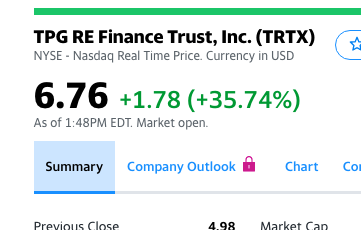mattstoller | Three weeks ago, the government passed a giant multi-trillion dollar
bailout. Supposedly, it was money for a host of stakeholders, including
hospitals, states, Wall Street banks, big business, the unemployed, and
small businesses. Today the Federal Reserve built on top of Congress’s
framework, announcing
yet another multi-trillion dollar set of facilities, on top of what it
already put out, to help cities, states, small businesses, main street
businesses, and so on and so forth.
So what has happened so far?
This is today’s change in stock price of a real estate venture run by
one of largest private equity funds in the world.
A
thirty five percent jump in a day is… a lot. The reason the stock
skyrocketed is because investors believe the new measures from the
Federal Reserve will bailout the debt of this private equity fund.
There’s a ‘monetary bazooka’ aimed at the economy. And yet there’s a
puzzle. If there’s money for the entire economy, why is that normal
people and small businesses can’t access unemployment insurance and
lending programs? To put it another way, why is the money meant for
everyone only showing up in the stock market?
The reason is
because money has to travel through institutions, and right now, the
institutions for the powerful function well, and those for the rest of
us are rickety and broken. So money gets to the rich first. Eventually,
some money will get to the rest of us, but in the interim period before
that money fully circulates, the wealthy can use their access to money
to buy up physical or financial assets.
An 18th century French
banker and philosopher named Richard Cantillon noticed an early version
of this phenomenon in a book he wrote called ‘An Essay on Economic Theory.’
His basic theory was that who benefits when the state prints a bunch of
money is based on the institutional setup of that state. In the 18th
century, this meant that the closer you were to the king and the
wealthy, the more you benefitted, and the further away you were, the
more you were harmed. Money, in other words, is not neutral. This
general observation, that money printing has distributional consequences
that operate through the price system, is known as the “Cantillon
Effect.”



0 comments:
Post a Comment